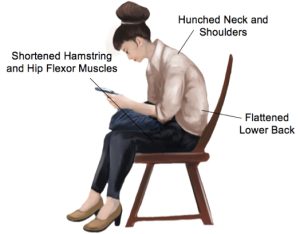CUMBERLAND PHYSIOTHERAPY PARRAMATTA: For most of us, screen time and sitting go hand in hand and both are only increasing as our lives move online. While short periods in any posture aren’t harmful, a lack of movement combined with long periods spent in hunched positions can lead to spinal pain, headaches and even shoulder pain. If you’re noticing yourself needing to spend more time in front of a screen, here are a few tips that can help you to keep flexible and avoid pain.
Set movement breaks
Posture in itself isn’t always a problem. Spending long periods of time in these postures without taking breaks is a little more problematic. When your body is so used to one position, muscles may become shorter and joints a little stiffer, making it harder to move out of this posture and cause pain and discomfort.
You can break up your day by setting a timer to move and take a break every 20-30 minutes. Using these short breaks for movement is a great way to both help focus at work and keep your body more flexible.
Setup your work and home environment properly
Adjusting your work station or setting up a place to relax at home where to you can avoid a hunched posture can help you to reduce time in the same posture. Your physiotherapist can give you tips for how to setup your home and office environment correctly.
Take stock of your time spent sitting
Time in the car, time on your computer and time on the couch can all quickly add up without you realising. By accounting for the amount of time you spend sitting, you can find more ways to move. For example, if you notice that you’re sitting down as soon as you get home, try swapping out watching an episode to relax for a walk while listening to a podcast.
Ask your physio for specific stretches
If you can identify the posture you spend the most time in, your physio can help you to develop a specific exercise and stretching program to counteract these positions most directly and keep you strong and flexible.
None of the information in this article is a replacement for proper medical advice. Always see a medical professional for advice on your individual injury.

